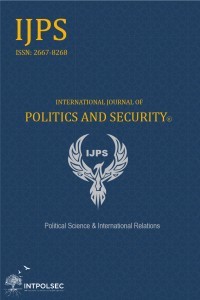Tarihten Bugüne Rusya'nın Arktik Politikaları: Değişimler ve Süreklilikler
Güvenlik, İş Birliği, Ulusal Çıkar, Arktik
Russia’s Arctic Policies From History To Date: Changes and Continuities
Arctic, Cooperation, National Interest,
___
- “America and Britain Play Cold War Games with Russia in the Arctic”. The Economist, 10 May 2020. https://www.economist.com/europe/2020/05/10/america-and-britain-play-cold- war-games-with-russia-in-the-arctic (Erişim: 28.11.2020).
- ISSN: 2667-8268
- Yayın Aralığı: Yılda 2 Sayı
- Başlangıç: 2019
- Yayıncı: Fikret BİRDİŞLİ
Arktik Bölgede Çevresel Bozulma, Strateji ve Rekabet: Çevresel Güvenlik Bağlamında Bir Değerlendirme
İsmail Utku CANTÜRK, Senem ATVUR
Kuşak ve Yol Girişimi Bağlamında Çin’in Arktik Politikası
Arktik Bölgesinin Kopenhag ve Aberystwyth Ekolü İle İncelenmesi
Arktik Konseyi ve Türkiye’nin Unutulan Arktik Konseyi Gözlemci Üyelik Başvurusu: İsviçre Örneği
Arktik Yerli Halkları için İnsan Güvenliği Sorunu Olarak İklim Değişikliği
Arktik Bölgesinde Yaşanan Güncel Sorunlar ve İkili Anlaşmazlıklar
Russia's Arctic Policy: Economic Development, Regional Priorities, Territorial Sea
Elif Hatun ÖNAL - KILIÇBEYLİ, Inga SOCHNEVA, Oleg SOCHNEVA
Ozone Diplomacy, Ozone Regime Negotiations and Arctic
Evolving Arctic Security Architecture Towards a Cooperative One
Climate Change and Hard-Soft Security Nexus: Future of Arctic Security Cooperation
